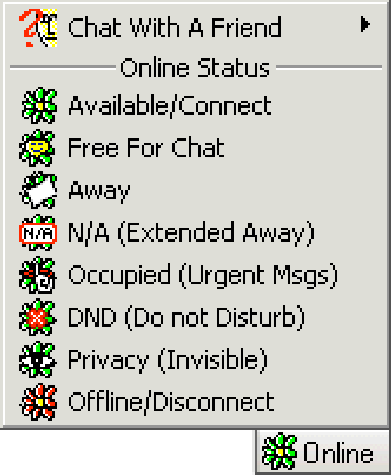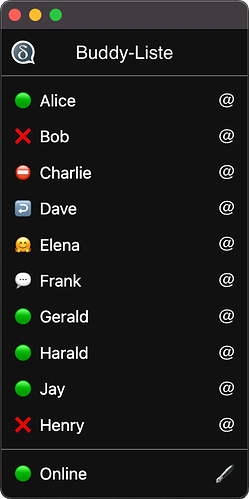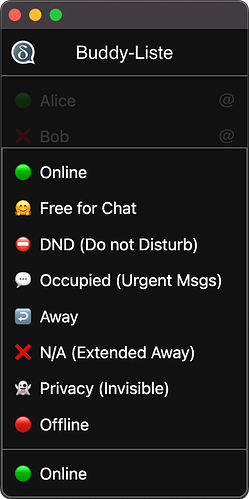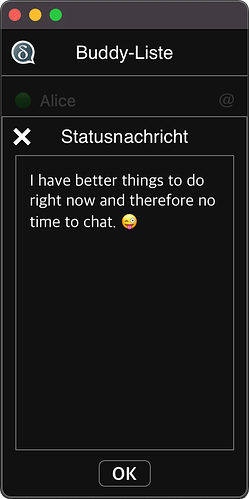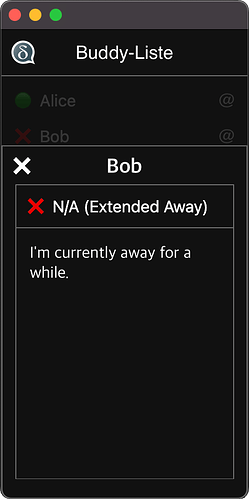There is an open source spreadsheet https://app.ironcalc.com/ if someone wants to package it.
Source code is at GitHub - ironcalc/IronCalc: Main engine of the IronCalc ecosystem
It has some API to compare states, but I don’t see how to turn changes into updates, so maybe it is not going to work for collaborative editing.
That’s a nice idea.
I noticed with the “Editor” app that the “export” feature just copies the text to the chat, though I expected it would export to a text file on the device.
It would be nice to have the option of exporting to a text file on the device.
While testing the P2P messenger app, I had the idea for a buddy list app.
Many old-school messengers, such as ICQ or AIM, had a so-called buddy list in which the online status of a contact was displayed. Users could select various status icons and write their own status message. Then the list was placed somewhere on the edge of the screen. I find this feature very useful and no modern messenger I know has anything like it.
The P2P messenger already shows which peers are currently online. Therefore, this idea could also be an extension of this app.
I don’t know exactly how IROH works, but I think it should be possible for a peer to send additional information about their online status. The simplest thing would probably be to use emojis as status icons.
These were the status icons in ICQ:
I think the following emojis would be quite good for representing the status:
 Online
Online Free for Chat
Free for Chat Away
Away N/A (Extended Away)
N/A (Extended Away) Occupied (Urgent Msgs)
Occupied (Urgent Msgs) DND (Do not Disturb)
DND (Do not Disturb) Privacy (Invisible)
Privacy (Invisible) Offline
Offline
An “invisible mode” is probably technically not possible, because a connection to the peers must exist. But it is not that important.
Users would create a group with all contacts who want to share their status and post the buddylist app there.
Of course, this app would only really make sense in DC-Desktop, because it allows multiple webxdc apps to be run in parallel, even from different profiles.
Originally I wanted to suggest that you could open an one-on-one chat with that contact by clicking on the “@” in the list.
The chat could be opened in a separate window like in this proposal:
As far as I know, since version 1.50 it is unfortunately no longer possible to access the email address.
Example Images:
The buddy list:
Select your status by clicking on the bottom icon (Online):
Create your own status message by clicking on the pen:
View a contact’s status message by clicking the name or status icon:
the Live Chat app already could be used as a buddy list, it doesn’t allow to set a different status, only “online”, but you can change your nick so you could change it to “foo - away!”
I recently tested the MARL app and thought that a similar app for DC backups would make sense. This would allow users to browse through a backup to search for contacts or specific messages. It would be even better if individual chats could be exported as HTML or text files.
But what would be the point? If you can just import the backup on DC itself (without needing a webxdc) and search for contacts, specific messages, etc.
I think an app like this would have two advantages:
-
Chat export:
In my opinion, exporting chats makes sense, as it allows users to store their chat histories outside of DC in a format that is generally readable. Not everyone knows how to use an SQLite database.
Unfortunately, it is not possible to export chats in DC like in Telegram, for example. With this app, you could do this without having to make changes to DC itself and thereby increasing its complexity. -
More convenient browsing of old backups:
It makes sense to start a new backup from time to time so that it doesn’t get too big. Otherwise, transferring it to another device via QR code takes significantly longer. In addition, you carry too much information with you, which could be a problem if your phone is lost, stolen or confiscated. Of course, it is possible to read an old backup in DC, but user must not forget to disconnect the internet connection before so that things don’t get messed up. Therefore, a small backup browser would be useful to search through older backups.
Computational notebook
Fore example, Marimo supports running Python code in a computational notebook locally, without a backend:
It is still large and pulls static files from CDNs, but something similar and self-contained should be possible as an .xdc for another language or some embedded Python implementation, with “cells” and maybe outputs being shared as Webxdc updates while executed locally.
There is a Guile Hoot webxdc, but it just presents a REPL and has no way to work on a single “document” in the chat. Computational notebook can be a way to collaborate for multiple chat members without stumbling into each other.
DOOM, just an idea.
This type of format can also be considered for attachments Polyglot (computing) - Wikipedia
I would really like this because I like jupyter, who knows if you could even use it to interact with chat messages.
A “content warning” app to provide a simple clickthrough feature for sensitive content as a workaround until Delta Chat includes this as a native feature as requested here. The app can simply let the person who shares the app enter some text or upload some image or video and display this to everyone who opens the app.
